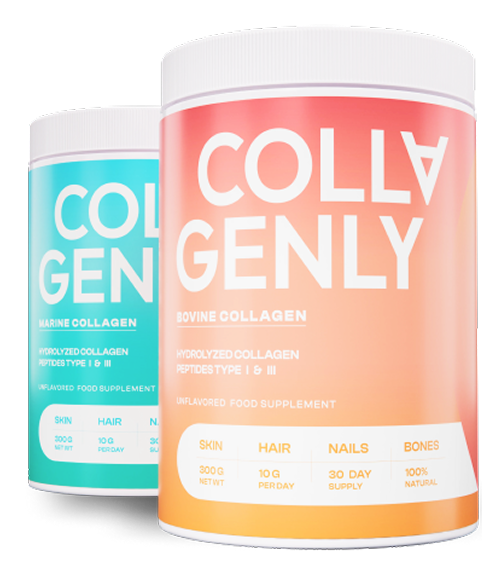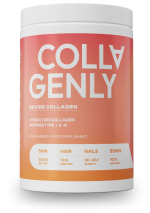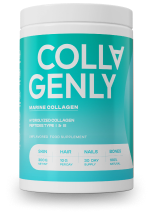Collagen is often referred to as the “building block” of the body – and for good reason. It’s the most abundant protein in our bodies, playing a central role in maintaining the structure, flexibility, and resilience of our skin, bones, muscles, tendons, and ligaments. As the demand for collagen supplements continues to rise, it’s worth exploring what collagen really is, why it’s important, and what benefits it can offer.
What Is Collagen?
At a molecular level, collagen is a protein made of amino acids, specifically glycine, proline, and hydroxyproline. It’s found in connective tissues, skin, cartilage, and bones, where it works to provide structural support. There are at least 16 types of collagen, but the majority in the human body falls under four main types:
- Type I Collagen: The most abundant form, making up nearly 90% of your body’s collagen. It’s found in the skin, bones, tendons, and ligaments, providing strength and elasticity.
- Type II Collagen: Commonly found in cartilage, which cushions joints and is critical for joint health.
- Type III Collagen: Often found alongside Type I in the skin and blood vessels, helping tissues to expand and contract.
- Type IV Collagen: Located in the skin layers and important for filtration functions, such as those in the kidneys.
Our bodies naturally produce collagen, but this process slows down with age. Starting in our 20s, we gradually lose collagen, which can lead to common signs of aging like wrinkles, sagging skin, and joint stiffness.
BOVINE & MARINE COLLAGEN Get Yours Today!
Shop Now
What Causes Collagen Decline?
Several factors contribute to collagen decline. These include:
- Aging: Natural aging reduces collagen production.
- Sun Exposure: UV rays damage collagen fibers and promote faster degradation.
- Lifestyle Choices: Smoking, excessive sugar intake, and poor hydration can all accelerate collagen breakdown.
- Environmental Toxins: Pollutants and free radicals can damage existing collagen and hinder new collagen synthesis.
This decline can affect the skin’s elasticity, bones’ density, and overall joint health, leading many people to turn to collagen supplements to help restore what’s been lost.
The Top Health Benefits of Collagen
Here are some of the main reasons why collagen has become a cornerstone in health routines.
Skin Health and Anti-Aging
One of the most popular uses of collagen supplements is for improving skin health. Collagen contributes to skin elasticity, hydration, and overall texture. Studies suggest that taking collagen peptides may help slow the aging process by reducing wrinkles and dryness. Collagen can boost the body’s ability to retain moisture, which is essential for a smooth and supple complexion.
Joint Pain Relief
As cartilage weakens with age, it’s common to experience joint pain. Collagen, especially Type II, can aid in supporting joint health and reducing symptoms of osteoarthritis. Several studies have indicated that collagen supplements may help relieve joint pain, particularly in physically active individuals who put repetitive stress on their joints. By strengthening cartilage, collagen can offer a natural way to enhance mobility and reduce discomfort.
Bone Health
Bones are primarily made up of collagen, which gives them structure and strength. As collagen levels drop with age, bones become more brittle and prone to fractures. Research suggests that collagen supplements may help stimulate bone formation and improve bone mineral density. This is particularly valuable in preventing osteoporosis, a common condition in older adults, especially women.
Muscle Mass Support
Collagen is an essential component of muscle tissue, and it may help improve muscle mass in people with age-related muscle loss. Studies have shown that collagen supplements, combined with resistance training, can boost muscle strength and function. This is largely due to collagen’s role in providing structure to muscles, allowing for better performance and recovery.
Heart Health
While not as widely discussed, collagen may also support cardiovascular health. Collagen is found in blood vessels, giving them flexibility and resilience. Some studies suggest that collagen supplements may help reduce artery stiffness and improve blood vessel function, thereby reducing the risk of heart-related conditions.
Gut Health
Collagen can be beneficial for gut health, especially for those with inflammatory digestive conditions like irritable bowel syndrome (IBS) or leaky gut syndrome. The amino acids in collagen, such as glycine and glutamine, can support the integrity of the gut lining, potentially reducing inflammation and enhancing digestion.
Are There Side Effects of Collagen Supplements?
Collagen supplements are generally well-tolerated, but there are a few potential side effects to keep in mind.
- Digestive Disturbances: Some people may experience mild gastrointestinal discomfort, including bloating, nausea, or diarrhea, especially when starting collagen supplements.
- Kidney Concerns: High doses of collagen may raise oxalate levels in the body, potentially contributing to kidney stone formation in individuals with a history of kidney issues.
Choosing the Right Collagen Supplement
When selecting a collagen supplement, consider the following factors:
- Source: Collagen can be sourced from bovine (cow), marine (fish), and even plant-based ingredients. Bovine and marine collagen are the most common.
- Dosage: Most studies use a daily dose of 2.5 to 15 grams, depending on the purpose. It’s best to follow the dosage recommended on the supplement label.
- Purity and Quality: Choose collagen products from reputable brands like Collagenly that offer transparency about their sourcing and third-party testing. Collagen peptides, which are broken-down proteins, are easier to digest and absorb.
Natural Ways to Boost Collagen Production
In addition to supplements, there are natural ways to support collagen levels:
- Eat a Collagen-Rich Diet: Foods high in collagen, such as bone broth, fish skin, and chicken, can naturally support collagen levels. Additionally, eating foods high in Vitamin C (like citrus fruits and berries), zinc (found in shellfish and nuts), and amino acids (found in meat, eggs, and dairy) promotes collagen synthesis.
- Limit Sun Exposure and Smoking: Both UV exposure and smoking accelerate collagen breakdown, so wearing sunscreen and avoiding smoking can protect your skin’s natural collagen.
- Stay Hydrated: Proper hydration is essential for maintaining skin elasticity and preventing collagen degradation.
Final Thoughts on Collagen
Collagen plays a crucial role in maintaining our body’s structural integrity, supporting everything from skin elasticity to joint health. While our bodies produce collagen naturally, supplementing with collagen can help offset age-related declines, especially for those seeking improvements in skin appearance, joint function, bone density, and even muscle mass.
Finally, consider combining supplements with a healthy lifestyle that supports collagen retention, such as a balanced diet, regular hydration, and skin-protective habits. Whether you’re looking to reduce signs of aging, improve joint mobility, or support overall health, collagen is a versatile and valuable addition to any wellness routine.
 your Cart is empty
your Cart is empty 

 Verified Customer
Verified Customer 


